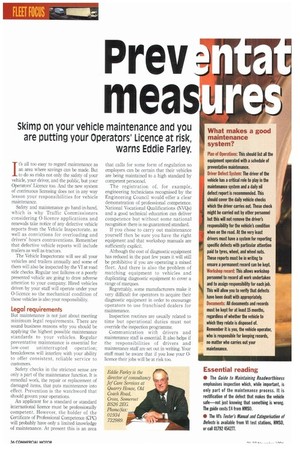Prey meas
Page 38

If you've noticed an error in this article please click here to report it so we can fix it.
/tS all too easy to regard maintenance as an area where savings can be made. But to do so risks not only the safety of your vehicle, your driver, and the public, but your Operators' Licence too. And the new system of continuous licensing does not in any way lesson your responsibilities for vehicle maintenance.
Safety and maintenance go hand-in-hand, which is why Traffic Commissioners considering 0-licence applications and renewals take notice of any defective vehicle reports from the Vehicle Inspectorate, as well as convictions for overloading and drivers' hours contraventions. Remember that defective vehicle reports will include trailers as well as tractors.
The Vehicle Inspectorate will see all your vehicles and trailers annually and some of them will also be inspected by the VI at road side checks. Regular test failures or a poorly presented vehicle are going to draw adverse attention to your company. Hired vehicles driven by your staff will operate under your 0-licence so the mechanical condition of these vehicles is also your responsibility.
But maintenance is not just about meeting minimum legal requirements. There are sound business reasons why you should be applying the highest possible maintenance standards to your vehicles. Regular preventative maintenance is essential for low-cost uninterrupted operation; breakdowns will interfere with your ability to offer consistent, reliable service to customers.
Safety checks in the strictest sense are only a part of the maintenance function. It is remedial work, the repair or replacement of damaged items, that puts maintenance into effect. Prevention is the watchword that should govern your operations.
An applicant for a standard or standard international licence must be professionally competent. However, the holder of the Certificate of Professional Competence (CPC) will probably have only a limited knowledge of maintenance. At present this is an area that calls for some form of regulation so employers can be certain that their vehicles are being maintained to a high standard by competent personnel.
The registration of, for example, engineering technicians recognised by the Engineering Council would offer a clear demonstration of professional competence. National Vocational Qualifications (NVQs) and a good technical education can deliver competence but without some national recognition there is no guaranteed standard.
If you chose to carry out maintenance yourself then be sure you have the right equipment and that workshop manuals are sufficiently explicit.
Although the cost of diagnostic equipment has reduced in the past few years it will still be prohibitive if you are operating a mixed fleet. And there is also the problem of matching equipment to vehicles and duplicating diagnostic equipment to cover a range of marques.
Regrettably, some manufacturers make it very difficult for operators to acquire their diagnostic equipment in order to encourage operators to use franchised dealers for maintenance.
Inspection routines are usually related to time but operational duties must not override the inspection programme.
Communication with drivers and maintenance staff is essential. It also helps if the responsibilities of drivers and maintenance staff are set out in writing. Your staff must be aware that if you lose your 0licence their jobs will be at risk too.




















































































































































































































